| Srl | Item |
| 1 |
ID:
129558
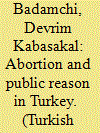

|
|
|
|
|
| Publication |
2014.
|
| Summary/Abstract |
During May and June 2012, the question of abortion was hotly debated in Turkish public forums. This paper analyzes the main characteristics of this abortion debate using John Rawls's conception of public reason as a normative framework. In doing so, speeches and declarations on abortion made by legislators are critically evaluated. The arguments in the debate are examined with a view to interpret how the issue should be discussed as far as the demands of public reason are concerned. From a Rawlsian framework, it is observed that the pro-ban position (Adalet ve Kalk?nma Partisi) is far from contributing to a reasonable balance of political values on abortion whereas the contra-ban position (Cumhuriyet Halk Partisi) satisfies the demands of public reason. Moreover, it is argued that, the latest proposed legislation on abortion cannot be viewed as an outcome of a reasonable balance of political values but is rather an outcome of pragmatic compromise.
|
|
|
|
|
|
|
|
|
|
|
|
|
|
|
|
| 2 |
ID:
167232
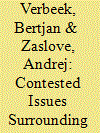

|
|
|
|
|
| Summary/Abstract |
Populism seems to be a well-established notion in public and academic debate alike. Nevertheless, several issues surrounding populism are still contested and thus merit closer attention. These contested issues encompass the extent to which populism is novel and ubiquitous; the scope of the phenomenon; the merits of the various definitions of populism; its political colour(s); the potential danger it poses to democracy; its appropriateness to govern; as well as populism’s impact beyond national borders.
|
|
|
|
|
|
|
|
|
|
|
|
|
|
|
|
| 3 |
ID:
116576
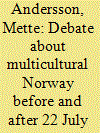

|
|
|
| 4 |
ID:
124274
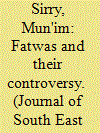

|
|
|
|
|
| Publication |
2013.
|
| Summary/Abstract |
This article discusses a different side of two controversial fatwas - one against Muslims participating in Christmas celebrations and the other against pluralism, liberalism and secularism - issued by the Majelis Ulama Indonesia (MUI, Council of Indonesian Ulama). Most studies on MUI have emphasised the role that the Council's fatwas have played in inciting sectarian violence in Indonesia. Without denying the connections between violence and the MUI fatwas, this article argues that these controversial fatwas have also opened up room for more fruitful and constructive discussions among different religious groups in Indonesia. This article asks: What were the roots of the controversy over these intolerant fatwas? How did the state respond to them? And what does the controversy over these fatwas tell us about the nature of public debate on Islam in Indonesia? By answering these questions this article will shed light on aspects of contemporary Indonesian public debates about Islam that have been overlooked in current scholarship
|
|
|
|
|
|
|
|
|
|
|
|
|
|
|
|
| 5 |
ID:
072173
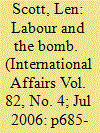

|
|
|
| 6 |
ID:
128013
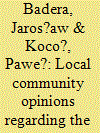

|
|
|
|
|
| Publication |
2014.
|
| Summary/Abstract |
Surface lignite mining covers large areas and usually generates social conflicts which pose one of several energy security threats to certain states. Therefore, defining the social conditions determines the success of a mining project. Two communes were chosen for a public opinion study: Kleszczów, where the Be?chatów mine is located, and Z?oczew, where a lignite deposit will soon be developed. The analysis shows, as opposed to other areas in Poland that have been projected for development, that both local communities are characterised by a high level of acceptance for lignite mining. In both cases, awareness about the profits was stronger than anxiety about the investment's negative effects. However, most inhabitants could not assess the mining company's diligence concerning its responsibility for mining damages as well as the diligence of external experts assessing the environmental impacts of excavation. Most respondents also could not assess if the legal regulations of public participation in the decision process were sufficient, but the negative opinions outweighed the positive ones. From the perspective of the energy policy, dialogue-type social communication is needed for every case of a new energy-mining project. Research on local public opinion should be the first step to opening up a social debate.
|
|
|
|
|
|
|
|
|
|
|
|
|
|
|
|
| 7 |
ID:
163205
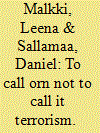

|
|
|
|
|
| Summary/Abstract |
This article looks at how domestic acts of ideologically-motivated violence have been treated in Finnish public discussion with a particular focus on how the word “terrorism” has and has not been used to characterize such incidents. The work demonstrates that Finnish public debate has, with certain notable exceptions, primarily avoided labelling any violent attacks in the country as terrorism. This reluctance stems from Finnish traditions of crisis management, counterterrorism, and politics. Furthermore, the propensity to use the term “terrorism” cannot be explained by such characteristics of the attack itself as the number of casualties or whether it was perpetrated by ingroup or outgroup members. Rather than “what has happened,” the question of calling or not calling an act terrorism comes down to the question of “what needs to be done.” The article contributes to academic debate by investigating a surprisingly under-researched aspect of how the term terrorism is used in public discussion while also shedding new light on the debate in Finland, a country seldom touched upon by research of terrorism and political violence.
|
|
|
|
|
|
|
|
|
|
|
|
|
|
|
|